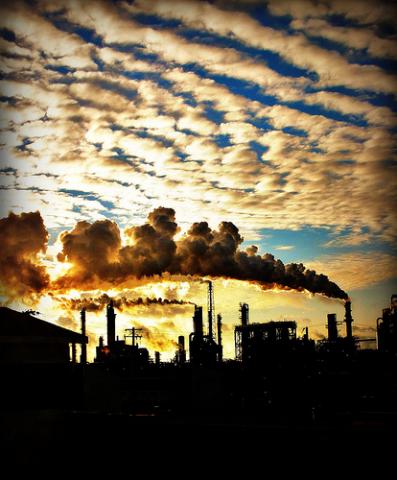Each year, in advance of United Nations (U.N.) climate discussions, governments around the world submit an inventory of their carbon emissions. This year, Canada is taking a unique approach to lower its reported emissions in preparing the annual carbon inventory – it has purposefully excluded information in order to give the false impression that when it comes to climate-altering tar sands pollution, “everything is fine.”
In reality, Canada’s carbon emissions have tripled since 1990, and Canada is making only minor progress to lower its carbon production 17% by 2020, according to Environment Canada’s own figures.
Last week, however, it was revealed that in the 567-page report detailing the country’s emissions, the Canadian government decided not to include 2009 data. Why? Perhaps because it documents a 20% increase in pollution from Alberta’s tar sands industry. The elusive data was only gradually released through emails in response to an investigation by Postmedia News.
Canada’s effort to hide tar sands pollution is frightening, greenwashing aside, for several reasons:
• Tar sands makes up about 6.5% of the country’s total emissions, and is arguably the most important contributor to the country’s overall emissions (up 11% in 2009);
• Canada is the world’s sixth largest oil producer and tar sands production is expected to increase to 3.5 billion barrels of oil per day by 2015, to 4.2 billion barrels by 2020 and rising to 4.7 billion barrels by 2025 – an increase of 68% by 2025• The U.S. Environmental Protection Agency estimates that carbon emissions from tar sands oil is approximately 82% higher than average oil.
The government’s most recent data reveals that the rules in place to control tar sands pollution are not effective, since the industry has failed to lower emissions intensity per barrel of oil, as required. Mark Johnson, spokesman for Environment Canada said the newly released 2009 figures showed that there is “very little change in the total emissions intensity in oilsands.” In fact, industry claims that emissions per barrel had improved 39% since 1990, have been revised to around 29%.
Previously, the tar sands industry responded to challenges on its environmental practices by cultivating an image that the tar sands represent “ethical oil” as compared to importing oil from countries like Saudi Arabia, Venezuela or Nigeria. Oil producers even commissioned Cambridge Energy Research Associates to prepare a report [pdf] suggesting that emissions from tar sands oil is merely 5-15% higher than traditional oil.
Now the dirty oil industry is not even trying to defend spiraling emissions growth. According to Travis Davies, spokesman for the Canadian Association of Petroleum Producers, the industry believes it can still clean its operations through “incremental improvements” over the next five years.
Unfortunately, incremental steps will do little to help Canada achieve progress towards its lagging pollution-reduction goals, which are not aggressive enough to match the scientific evidence of anticipated climate change impacts.
In January, the National Round Table on the Environment and the Economy called [pdf] on Canada to stop waiting for the U.S. to take action on climate change. More recently, the Conference Board of Canada predicts continued failure on climate action in a highly critical report describing the lack of coordinated efforts between the Canadian federal and provincial governments.
At this month’s ongoing U.N. climate discussions in Bonn, Germany, Canada is being challenged by officials from Australia, China, Lebanon, the United Kingdom and the Philippines who are questioning government fossil fuel subsidies, tar sands emissions disclosure, the lack of low-carbon investments and the basis for the country’s weak emissions reduction target.
Peter Betts, the lead European Union negotiator and a director at the United Kingdom’s Department of Energy and Climate Change, says he was “struck that the colleague from Canada didn’t refer to the tarsands issue, or at least only once in passing…”
Canadian negotiators seem unfazed by the criticism, content to remain laggards on climate action. They not only admit but boast that the Harper-led government will not meet the emissions reduction commitments Canada agreed to under the 1997 Kyoto Protocol. Judith Gelbman, a member of Canada’s delegation, sums up Canada’s politically-motivated position:
“Now that we’ve finished our election we can say now that Canada will not be taking a target under a second commitment period of the Kyoto Protocol.”
Subscribe to our newsletter
Stay up to date with DeSmog news and alerts






